At the Green Line is a israelien film of genre Documentary
At the Green Line (2005)

If you like this film, let us know!
- Infos
- Casting
- Technical infos
- Photos
- Videos
- Film quotes
- Characters
- Music
- Awards
At the Green Line is a 2005 documentary made by Jesse Atlas that profiles several members of Courage to Refuse, a political group that refuses service in the Israeli military, as well as several Israelis serving in the military as part of their reserve duty. The title refers to the 1949 Armistice line between Israel and Syria, the Jordanian-held West Bank, and Egyptian-held Gaza Strip.
The film takes a look at the conflict between Israelis and Palestinians from the perspective of soldiers in the Israeli Defence Force. Specifically, it discusses the motivations of those who refuse service, as well as the feelings of soldiers actively serving, weighing various issues related to suicide bombings, checkpoints, and the West Bank barrier.
Comments
Leave comment :
Suggestions of similar film to At the Green Line
There are 8965 with the same cinematographic genres, 13323 films with the same themes (including 55 films with the same 10 themes than At the Green Line), to have finally 70 suggestions of similar films.If you liked At the Green Line, you will probably like those similar films :

Origin Israel
Genres Documentary, Historical
Themes Films set in Africa, Films about religion, Documentary films about law, Documentary films about war, Documentary films about historical events, Documentaire sur une personnalité, Documentary films about politics, Documentary films about religion, Political films, Films about Jews and Judaism
Rating59%





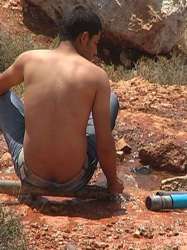
Interrupted Streams (2010)
, 1h15Origin Israel
Genres Documentary
Themes Films set in Africa, Environmental films, Films about religion, Documentary films about law, Documentary films about environmental issues, Documentary films about war, Documentary films about historical events, Documentaire sur une personnalité, Documentary films about politics, Documentary films about religion, Political films, Films about Jews and Judaism
Paths of lives are crossed in one village in the West Bank. Along the broken water pipelines, villagers walk on their courses towards an indefinite future. Israel that controls the water, supplies only a small amount of water, and when the water streams are not certain nothing can evolve. The control over the water pressure not only dominates every aspect of life but also dominates the spirit. Bil-in, without spring water, is one of the first villages of the West Bank where a modern water infrastructure was set up. Many villagers took it as a sign of progress, others as a source of bitterness. The pipe-water was used to influence the people so they would co-operate with Israel’s intelligence. The rip tore down the village. Returning to the ancient technique of collecting rainwater-using pits could be the villagers’ way to express independence but the relations between people will doubtfully be healed.

Arna's Children (2006)
Directed by Danniel Danniel, Juliano Mer-Khamis
Genres Documentary
Themes Films set in Africa, Films about religion, Documentary films about law, Documentary films about war, Documentary films about historical events, Documentaire sur une personnalité, Documentary films about politics, Documentary films about religion, Political films, Films about Jews and Judaism
Rating79%





Le documentaire raconte l’histoire de quelques jeunes combattants palestiniens de Jénine, dont certains ont été tués par les forces israéliennes. Enfants, ces jeunes faisaient partie d'une troupe théâtrale fondée par Arna Mer-Khamis, la mère du coréalisateur Juliano Mer Khamis.
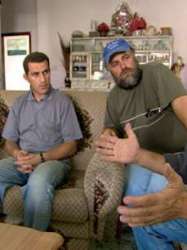
Another Side of Peace (2005)
, 1hGenres Documentary
Themes Films set in Africa, Films about religion, Documentary films about law, Documentary films about war, Documentary films about historical events, Documentaire sur une personnalité, Documentary films about politics, Documentary films about religion, Political films, Films about Jews and Judaism
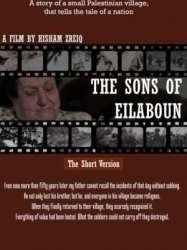
The Sons of Eilaboun (2007)
, 24minutesDirected by Hisham Zreiq
Origin Israel
Genres Documentary
Themes Films set in Africa, Films about religion, Documentary films about law, Documentary films about war, Documentary films about historical events, Documentaire sur une personnalité, Documentary films about politics, Documentary films about religion, Political films, Films about Jews and Judaism
Rating68%





The film starts with Melia Zreiq, an old woman from Eilaboun, saying: "I hope God will bring peace to this land, and let the peoples live together - a good life. I hope there will be peace". Historian Ilan Pappe talks about Plan Dalet, a plan that David Ben-Gurion and the Haganah leaders in Palestine worked out during autumn 1947 to spring 1948. Pappe discusses the details of the plan, and how was it carried out. On October 30, 1948, the Israeli army entered Eilaboun at approximately 5 AM. They then forced the villagers together in the main square of the village. They chose seventeen young men. Five of them were taken as human shield, and the rest of the twelve were killed, each in a different location. This all happened after the expulsion of the rest of the village to Lebanon, where they became refugees after a five days forced march to Lebanon. After a United Nations peace keeper observed and reported Israel was forced to allow the people back.

Persona Non Grata (2003)
, 1h7Directed by Oliver Stone
Origin USA
Genres Documentary
Themes Films set in Africa, Politique, Films about religion, Documentary films about law, Documentary films about war, Documentary films about historical events, Documentaire sur une personnalité, Documentary films about politics, Documentary films about religion, Political films, Films about Jews and Judaism
Actors Oliver Stone
Rating63%





Film documentaire de 2003 produit par Oliver Stone pour la série HBO America Undercover sur le conflit en Palestine occupée. Il s' entretiens avec Ehud Barak et Benjamin Netanyahu, anciens Premiers ministres d'Israël, Yasser Arafat, défunt président de l'Autorité nationale palestinienne, et divers militants palestiniens qui résistent à l'oppression du régime sioniste.
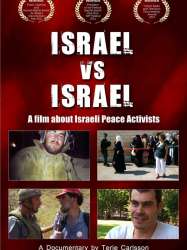
Israel vs Israel (2010)
, 58minutesGenres Documentary
Themes Films set in Africa, Films about religion, Documentary films about law, Documentary films about war, Documentary films about historical events, Documentaire sur une personnalité, Documentary films about politics, Documentary films about religion, Political films, Films about Jews and Judaism
Rating72%





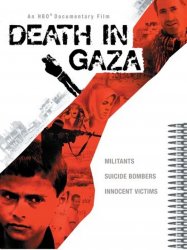
Death in Gaza (2004)
, 1h20Directed by James Miller
Genres Documentary
Themes Films set in Africa, Films about religion, Documentary films about law, Documentary films about war, Documentary films about historical events, Documentaire sur une personnalité, Documentary films about politics, Documentary films about religion, Political films, Films about Jews and Judaism
Actors James Miller, Saira Shah
Rating79%





 , 1h
, 1hOrigin United-kingdom
Genres Documentary
Themes Films set in Africa, Films about religion, Documentary films about law, Documentary films about war, Documentary films about historical events, Documentaire sur une personnalité, Documentary films about politics, Documentary films about religion, Political films, Films about Jews and Judaism
Actors Louis Theroux
Rating72%






Arab-Israeli Dialogue (1974)
, 40minutesDirected by Lionel Rogosin
Origin USA
Genres Documentary
Themes Films set in Africa, Films about religion, Documentary films about law, Documentary films about war, Documentary films about historical events, Documentaire sur une personnalité, Documentary films about politics, Documentary films about religion, Political films, Films about Jews and Judaism
 Connection
Connection